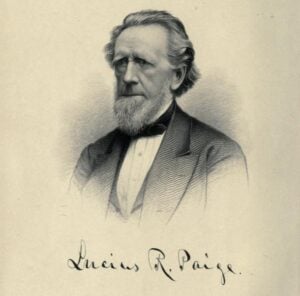 In November of 1844, five men “organized themselves into a society for historical and genealogical research” in Boston, Massachusetts.[1] The New England Historic Genealogical Society (NEHGS) was incorporated the following March. Prior to the society’s incorporation, several additional members were elected, the first being the Reverend Lucius Robinson Paige on 21 January 1845.[2] At the time of his death on 2 September 1896, he was the oldest member of NEHGS.[3] While the distinction of being the first member of NEHGS is noteworthy, his accomplishments during his lifetime are also worth a closer look.
In November of 1844, five men “organized themselves into a society for historical and genealogical research” in Boston, Massachusetts.[1] The New England Historic Genealogical Society (NEHGS) was incorporated the following March. Prior to the society’s incorporation, several additional members were elected, the first being the Reverend Lucius Robinson Paige on 21 January 1845.[2] At the time of his death on 2 September 1896, he was the oldest member of NEHGS.[3] While the distinction of being the first member of NEHGS is noteworthy, his accomplishments during his lifetime are also worth a closer look.
Lucius Robinson Paige was born 8 March 1802 at Hardwick, Worcester County, Massachusetts, the son of Timothy and Mary (Robinson) Paige.[4] Both his grandfather Colonel Timothy Paige and his father served during the Revolutionary War. Paige’s parents were Calvinists, but the Reverend Hosea Ballou’s Treatise on Atonement had such an impact on him, he decided to become a Universalist minister. He studied under Ballou and was ordained 2 June 1825.[5] Paige served in parishes at Springfield, Rockport, and Cambridge, Massachusetts, and published several books prior to resigning his pastorate in 1839.
In recognition of his work, he was awarded an honorary Master of Arts degree from Harvard in 1850, as well as an honorary degree (Doctor of Divinity) from Tufts in 1861.
After his resignation, Paige served as Cambridge town clerk in the 1840s and 1850s, becoming city clerk of Cambridge after its incorporation. He also served as president of Cambridgeport Bank for several years and was on the board of directors for close to four decades. He continued to publish a number of books, including History of Hardwick, Massachusetts, with a Genealogical Register; his six-volume work Commentary on the New Testament, which Paige referred to as “the principal labor of my life;”[6] and History of Cambridge, Massachusetts, 1630-1877, with a Genealogical Register. In recognition of his work, he was awarded an honorary Master of Arts degree from Harvard in 1850, as well as an honorary degree (Doctor of Divinity) from Tufts in 1861. He served as a trustee at Tufts, and in 1892 the school dedicated a dormitory building in Paige’s name. Dr. Elmer Capen, president of Tufts from 1875 to 1905, noted:
[Paige] never gave his readers anything for fact which he got by inference, or hearsay, or by a guess. For this reason his work in the historical field is of permanent value. . . . The founders of Cambridge and Hardwick were to him like the living men whom he met in his daily walks. His books are valuable to us, not only because of the thoroughness of research which distinguishes them, but because they set the past before us as it really was.[7]
Henry Wadsworth Longfellow echoed these sentiments in a letter presented to Paige on his eightieth birthday: “The importance of local or town histories can hardly be overestimated; they are the foundation on which all general history rests. For what Dr. Paige has done for Cambridge, we all owe him our thanks.”[8]
A year before Paige’s death, NEHGS celebrated its fiftieth anniversary. Author and journalist Charles Carleton Coffin addressed the attendees at the society’s anniversary celebration, looking back on the growth and progress of the country over the previous fifty years. He told the crowd “The history of past centuries is the story of what kings and potentates have done. The history of this century is what the people have done.”[9] Through his work, Lucius Robinson Paige played a role in the preservation of that history.
“The history of past centuries is the story of what kings and potentates have done. The history of this century is what the people have done.”
Notes
[1] “From Small Beginnings: Growth and Work of Historic Genealogical Society,” Boston Herald, 18 April 1895, 18.
[2] Rev. Alphonso Everett White, “Rev. Lucius Robinson Paige, A.M., D.D.,” The New England Historical and Genealogical Register 52 [1898]: 302.
[3] Massachusetts: Vital Records, 1841-1910, online image at americanancestors.org; White, “Rev. Lucius Robinson Paige, A.M., D.D.,” Register 52 [1898]: 302.
[4] Massachusetts: Vital Records, 1621-1850, online image at americanancestors.org.
[5] White, “Rev. Lucius Robinson Paige, A.M., D.D.,” Register 52 [1898]: 298.
[6] Lucius Paige biographical sketch, Dictionary of Unitarian and Universalist Biography, www.uudb.org.
[7] White, “Rev. Lucius Robinson Paige, A.M., D.D.,” Register 52 [1898]: 301.
[8] Ibid., 303.
[9] “Its 50th Anniversary: The Historic Genealogical Society Holds a Double Celebration,” Boston Daily Advertiser, 20 April 1895, 4.
Share this:
About Eileen Pironti
Eileen graduated with a B.A. from Saint Anselm College, and received an M.S. from American University. She wrote about her ancestors’ participation in the colonization of Nobles County, Minnesota in “‘An Invitation to the Land’: Reconstructing James and Eliza Conlon’s Migration to Minnesota,” which was published in the Summer 2011 issue of American Ancestors magazine. Eileen's interests include Irish and 19th century New England research.View all posts by Eileen Pironti →